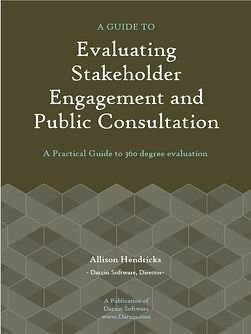How to Evaluate Stakeholder Engagement and Consultation
Why don’t we evaluate more often? The Stakeholder Engagement/Public Consultation field has grown incredibly over the last decade or two, with higher expectations for consultation, and engagement activities now part of ‘business-as-usual’ for most organisations in the public and private sectors. Yet only a very small percentage of those engagement processes are evaluated in any meaningful way. Evaluating consultation or engagement processes has a number of challenges, for example:
- How do you define the ‘end’ point of a process? It is not always clear cut. The broader social and environmental impacts of a process may take many years, and can be hard to disentangle from other events.
- What are the best measurement criteria – should they be process based or outcome based? If a mix of both, should they have equal weighting? The lack of broadly accepted criteria or evaluation methods makes this more of a challenge.
Before beginning an evaluation process for stakeholder consultation, it is useful to think about:
- How do we define success for our process and outcomes?
- Who needs to be involved in the evaluation?
- What are the priority issues (for them and for you)?
- What will be the most effective methods of conducting the evaluation?
- Who within the company is responsible for what activities?
- How will the results be used, reported and disseminated?
An Evaluation Framework should provide a balanced approach to evaluation. With a standard set of measures it helps save time, reduce costs, and provides some clear directions for improvement.
An ourline is our Evaluation Framework is presented below.
EVALUATION FRAMEWORK
The framework has three parts:
- A list of core principles and indicators for each principle – drawn directly from the wording of the Brisbane Declaration
- A rating scale to measure performance against each of the principles and indicators.
- A set of questions that provide more clarity on the indicators and that could be used to guide evaluation processes.
A 360 degree approach to evaluation
Your evaluation process should seek formal evaluation from multiple perspectives in order to create a 360 degree evaluation.
The three groups are:
- Stakeholders (participants and non-participants)
- The process implementers (your consultation team)
- Decision makers
Core Principles
The Evaluation Framework is based on a set of six core principles. These Principles were drawn from referencing various definitons of Community engagement/public consultation and drawn from the work done in developing the Brisbane Declaration that was created at the first United Nations Conference on Community Engagement.
Integrity |
When there is openness and honesty about the scope and purpose of engagement |
Inclusion |
When there is an opportunity for a diverse range of values and perspectives to be freely and fairly expressed and heard |
Deliberation |
When there is sufficient and credible information for dialogue, choice and decisions, and when there is space to weigh options, develop common understandings and to appreciate respective roles and responsibilities |
Influence |
When people have input in designing how they participate, when policies and services reflect their involvement and when their impact is apparent |
Capacity |
Meaningful community engagement seeks to address barriers and build the capacity and confidence of people to participate in, and negotiate and partner with, institutions that affect their lives, in particular those previously excluded or disenfranchised |
Sustainable Decisions |
Inclusive engagement requires that the poor and marginalized, and Indigenous peoples, are adequately resourced and mainstreamed to participate meaningfully and that they have a stake in the outcome and benefit equitably as a result of being involved |
To see more details and indicators for each of these core principles, download the free e-book (see below).
CONCLUSION:
Evaluation does not need to be complex or expensive. The Evaluation Framework we have developed gives you a simple yet robust way to evaluate your engagement and consultation processes. Using a standard set of balanced criteria, with standard evaluation questions and methodology, will give you actionable insights into how you can improve your engagement and consultation.
To learn more about evaluation framework and process, download our free e-book on it..


